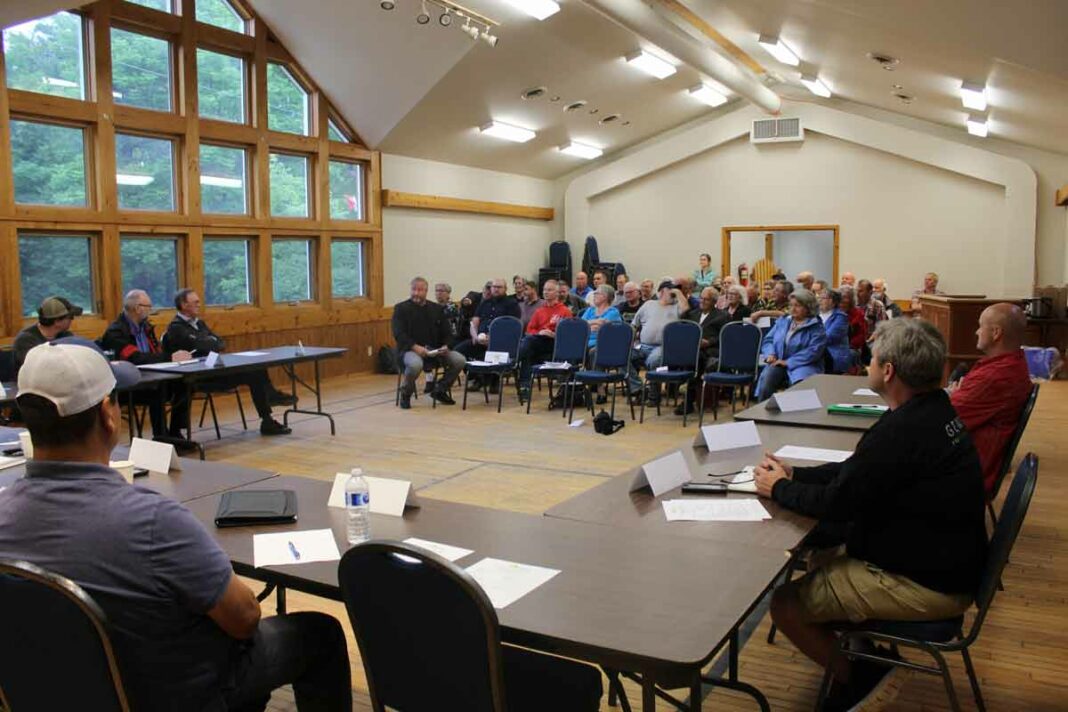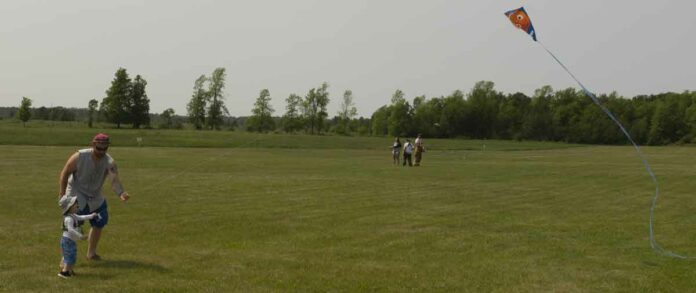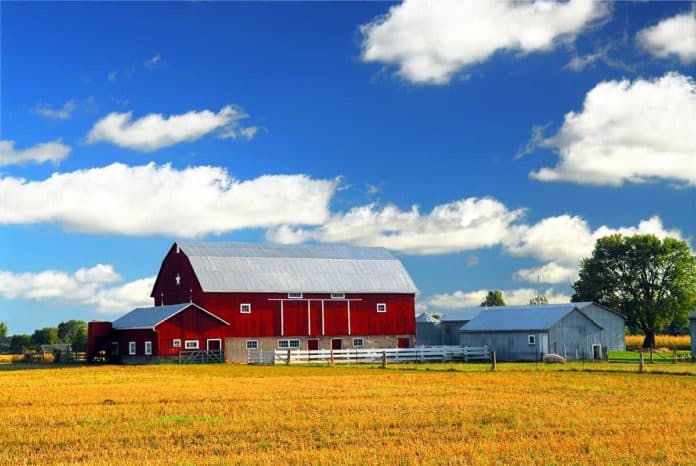KAGAWONG—The initial step has been taken by Manitoulin municipalities and First Nations toward coming up with solutions and ideas that the Island communities can work together on to deal with waste. And after a meeting attended by well over 50 people last week, a second meeting will take place this fall.
“We can pretend this meeting did not take place or we can move forward and continue to meet to find solutions to and reducing our waste and the way we handle it on the Island,” said Billings township councillor Vince Grogan, at an Island-wide waste management meeting attended by municipal, First Nation and provincial political leaders, waste management entrepreneurs and interested residents last week. “We have to make a solid commitment as municipal and First Nation leaders to improve the current situation and how we deal with and what we do with waste.” He suggested an Island-wide subcommittee be formed to gather input and garner ideas. “We have to start somewhere.”
Billings Mayor Bryan Barker said at the start of the meeting, “we would like to welcome everyone to Billings tonight to participate in the first Island-wide waste management meeting.”
“Whenever we talk about garbage we don’t get as many people in the legislature as there is here tonight,” said Algoma-Manitoulin MPP Michael Mantha. He said a lot of legislation “has pushed and handcuffed municipalities. The government is making it more difficult and expensive to take care of waste. And this means tough decisions have to be made by municipalities and first nations, and a lot of time is spent on this issue by municipal and First Nation staff.”
“I want to be your link to ministers and hear what you have to offer,” said MPP Mantha.
Councillor Grogan reminded everyone to keep an open mind. “The purpose of our meeting is to prepare for long-term waste diversion and areas like increasing recycling.”
Each of the municipal leaders outlined where their municipality stands in terms of waste management in their communities. In Dawson, the township is currently operating a transfer station recently approved by the province.
Jack Bould, a Gordon/Barrie Island councillor said in operating a transfer station (which Gordon/Barrie Island and Gore Bay do), “you always face issues of what can be accept and what can’t be accepted.”
Brad Wright, also a Gordon/Barrie Island councillor expressed concerns with what he understands is the Dodge Haulage site going to be closing in approximately 12 years. “We have heard this could take place in eight to 12 years, but this is a moving target depending on recycling and diversion of waste.”
However, Ernest Dodge of Dodge Haulage in Espanola said at this time he is working on expanding the site and has a current waste span of a minimum of 20 years and as many as 68.
“I would like to thank Bryan (Barker) and his team for bringing us together and hopefully we can find common ground on waste issues,” said Richard Stephens, mayor of Central Manitoulin. He said the municipality has been active in trying to handle solid waste and at one time had five operating landfills but with the closure of the Providence Bay landfill recently, none are operating. “This was an unplanned closure, as the province did not allow for the expansion of the landfill licence in Providence Bay. “We have moved forward with an agreement with GFL and Dodge Haulage to look after hauling our garbage, but we are in the midst of finding locations and services. Right now, we are hauling waste off-Island, an idea I don’t like.
Terence Corbiere reported that Wiikwemkoong Unceded Territory doesn’t have a landfill, but does have a transfer station. “We are looking for look more efficient operations,” he said, noting the community does have recycling and composting programs in place.
In NEMI it took about 10 years for the town to be able to get approval and open a landfill in the community, said Mayor Al MacNevin. There is a recycling component to the site and the projected lifespan of the site is 46 years.
Billings still has a landfill, and an application has been made for an expansion of the site (which currently has an expected lifespan of seven years) would see the expected lifespan to be 13-20 years. “We also face pushback on things we can’t process in the landfill. And trucking waste is not a good solution in my mind,” he said. “I would like to see several micro-stations set up around the Island for handling different waste materials, like crushing cans and the like. We hope with our discussions we can provide more solutions.”
For M’Chigeeng First Nation, Murray McGregor said a fire at the previous community landfill in 2010 caused the landfill to be closed. Since then, a temporary transfer station has been in place with a private owner. “We are hoping to be taking over operations of a new site in the fall and diverting waste away from the transfer station.”
In Tehkummah, Reeve John Deforge said the township has a landfill, and has applied for an extension of the licence and expansion of the site, but will have to close in a year if they are rejected.
Burpee and Mills councillor Roger Morrell said his municipality has a transfer station that handles and separate all the waste, steel, plastics, aluminum, and cardboard, which is all baled for recycling. And everything else goes into a bin and goes to Dodge Haulage.
“Those are the types of things and ideas I would like to look at Island-wide,” said Mr. Grogan.
Entrepreneurs like Colen McKeever of Kagawong, whose company CDM Agency is the Northern Ontario agent for Eco-Growth Environmental Inc. based in Calgary. Eco-Growth uses a proprietary technology to reduce food and yard waste in to a pathogen free biofuel material that is introduced into a biofuel boiler system, producing hot water that can be used for building heat or in industrial hot water processes, using a commercial dehydrator, reducing organic waste into a stable biomass among several other options.
Mathieu Gagnon of Waste Energy Solutions and Technologies (WEST) said WEST works with community, manufacturing and industrial clients to redirect their waste into centralized waste processing facilities. The facilities can be designed, built, owned and operated by WEST to provide on an Island-wide basis. They turn waste into energy and are generating renewable energy that will reduce the consumption of fossil fuels and reduce the carbon footprint. The clean energy can be used as a source of electricity, heating or cooling. He said the system they use don’t need the high volumes of waste that large cities like Toronto accumulate for their system to work on the Island.
“I agree with the one speaker tonight who said the province and Canada, everyone is scratching their heads on how to deal with waste,” said Deborah Moore. “Having this type of meeting is brilliant. But the solutions will not be found in one meeting, there will be a lot of work to do.”
“There has already been a lot of good ideas shared here tonight,” said John VanEvery. “We are all trying to do the best we can. We probably need a sub-committee set up to get input and look at all potential ideas and solutions.”
“When I met with (township) staff prior to this meeting we discussed where we want to go from here, and we agreed there is need for a sub-committee to be formed to bring all the expertise together. The Island has a lot of smart people with good ideas in regards to waste management that we can work toward, together,” said Mr. Grogan.
MPP Mantha said that one common theme that has come forward is education. “A lot of people who should be and would help look at options are not here tonight. We need everyone to be educated on waste and for everyone to buy into solutions being looked at. People need to know how they are being affected by all of this. A sub-committee being developed is the next best step to take.”
Derek Stephens, a Central Manitoulin councillor said the idea of working together on the Island for a waste solution problem “was tried about 20 years ago. We all agree that there are a lot of good ideas on how we can reduce waste and recycle. A big problem is the regulations in place on what municipalities can and cannot do. The governments continue to download restrictions.”
“In Central Manitoulin we had a landfill site in Providence Bay that had a lifespan of 25 years, then out of the blue the province said it had to close,” said Councillor Stephens. “They gave us a year to do this and now we are struggling. And when a landfill was looked at Island wide years ago, we had reports done on possible landfill locations, but those landowners whose property was being looked at said not in my back yard.”
“Most of the technology is not improving Canada. There are companies that try to get initiatives in place but then they don’t get approvals. There is tons of stuff we can’t do,” said Councillor Stephens. He pointed out after a while most municipalities dropped out of the discussion to have an island wide landfill site developed.
“We were identifying locations for a new site for the Island, but another problem is that councils change and agendas change,” Councillor Stephens continued. “That is one of the biggest problems we face as any municipality or First Nation. As well, governments will provide funding for studies but not for opening and operating landfills or other waste facilities.”
Mayor Barker said, “We would like to thank everyone for taking part this evening. I would encourage everyone to stay engaged. And I would encourage everyone to talk to your neighbours, friends about the idea of looking at ways to keep reducing waste and keeping it out of our landfills.”
Mayor Barker indicated, “as I said at the start this is the first meeting, a sub-committee is a great idea and we can look at ideas, get input and look at possible solutions to our waste problems. I don’t think any of us can drop out, we all need to work together and continue down the path we have started.”
The group agreed to meet again in September.





